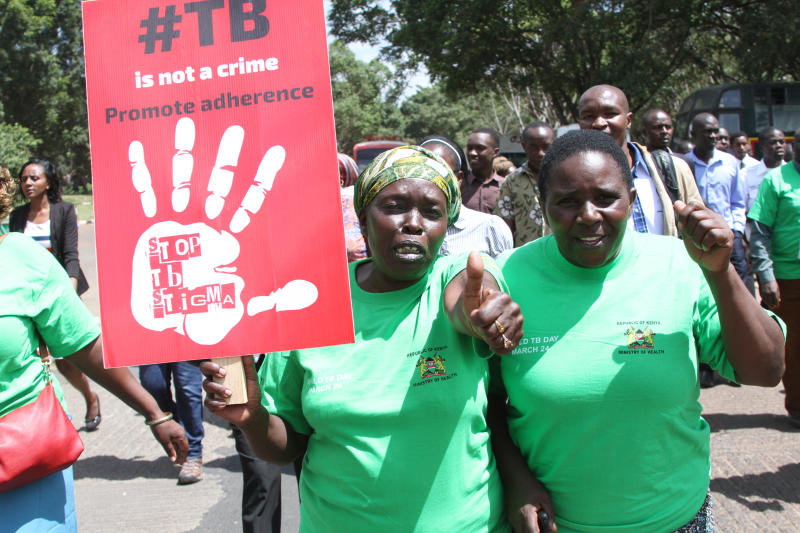A total of 678 new TB cases has been reported in Nakuru, even as Health experts sounded the alarm over rising cases of multi-drug resistant tuberculosis in the County.
County TB and Leprosy Coordinator, Dr Judy Barasa said the County had recorded over 20 multi-drug resistant (MDR-TB) cases in the past three months with the number of new cases of conventional TB recorded in the region over the same period being 678.
MDR TB is a type of tuberculosis (TB) whose bacteria are resistant to two main TB drugs (isoniazid and rifampin) rendering them ineffective. It is also resistant to the best second-line medications, Fluoroquinolones, and at least one of three injectable drugs.
The coordinator said the rise in the number of new MDR-TB cases was worrying since it was very costly to treat one case of the more virulent type of the disease as it takes up to 18 months to cure.
While disclosing that a recent prevalence survey in Nakuru had established that 181 per 100,000 people were TB infected, Dr. Barasa was happy that Nakuru was recording 87 percent TB treatment success rate and added that preventive therapy had reduced from six to three months.
“Tuberculosis preventive therapy works and we have been able to reduce co-infection rate by over 10 cent,” she said.
Dr Barasa at the same time said that Governor Susan Kihika’s administration had rolled out an initiative that will integrate Tuberculosis (TB) services into workplace health programs, to help reduce transmission within the community.
She said the initiative seeks to systematically engage workplaces in TB prevention and management adding that Sub-county health management teams, TB and leprosy coordinators, will work closely with Tuberculosis Accelerated Response and Care (TB ARC11) project, to integrate TB prevention and management in workplaces and learning institutions across the County.
Dr Barasa who was flanked by County Director of Public Health, Elizabeth Kiptoo emphasized the importance of regular TB screening at workplace, including among health workers, saying this will help in TB transmission control and management.
She urged the health workers to be on the frontline and lead by example, by taking regular TB screening, to help build confidence among the community members on the importance of TB screening and transmission control.
Dr Barasa explained that the main causes of TB resistance to drugs included poor choices of drugs, failure to complete prescribed treatment and use of sub-standard drugs in addition to inhaling bacteria that are already resistant to treatment.
“The symptoms of drug resistant TB are not any different from those of ordinary tuberculosis and include weakness, weight loss, fever, and night sweats,” she pointed out.
County Director of Public Health, Elizabeth Kiptoo said to minimize the infections, the health department was collaborating with all stakeholders including nongovernmental organizations to sensitize the residents to go for screening whenever they have symptoms.
She expressed the need to eradicate stigma noting that society still views TB patients as outcasts discouraging many people to go for screening.
“TB disease is treatable and that is why we are encouraging people to go for screening so that they can start treatment early if found positive,” said Ms Kiptoo.
She lauded Community Health Volunteers (CVHs) for playing the key role of referring all people showing TB symptoms to hospitals for screening adding that CHVs also help in contact-tracing for the diagnosed patients and making sure that those under treatment take their drugs as recommended.
Ms Kiptoo urged the health care workers to make use of the empowered community health volunteers to help cut the transmission of TB within the community and urged health workers in all the 11 Sub-counties to be the first-line advocates of TB screening and prevention, through sensitization campaigns at the grassroots.
High poverty levels in Kenya, estimated at 46 percent, have contributed to the burden of TB, through poor housing, poor nutrition, overcrowding in homes and at workplaces, alcohol and substance abuse and poor access to health care services.
Data from the World Health Organization (WHO) shows that Kenya is one of the 22 countries that contribute to about 80 percent of world TB cases. Kenya’s high burden leaves it ranking 15 out of the 22 most vulnerable countries globally.
Though in Africa, Kenya ranks fourth after South Africa, Nigeria, and Ethiopia in that order the country has continued to record great progress in combating the disease. Kenya has recorded a tremendous drop in TB-related mortalities from about 33,000 TB-related deaths in 2019 to 21,000 in 2021, according to the latest WHO global TB report.
The burden of tuberculosis (TB) in Kenya is among the highest in the world and the 4th cause of death among infectious diseases. It has an incidence rate of 210 cases per 100,000 people and a prevalence rate of 283 cases per 100,000 people. Mortality from TB in Kenya is also above the global average at 22 deaths per 100,000.
By Esther Mwangi and Tracy Okello





